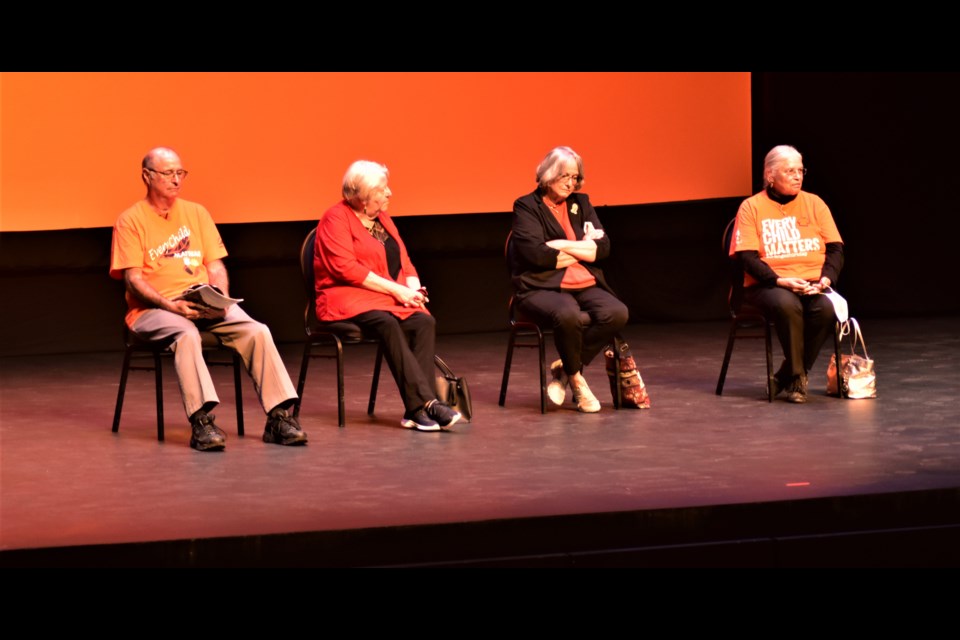Awareness and acknowledgement of the past is key to any form of truth and reconciliation, a Guelph audience heard Monday.
The truth about residential schools, stories from the survivors and the truth about treaties were shared by members of the Six Nations at the River Run Centre.
Four speakers outlined their experiences growing up under the systems implemented by the Canadian government and how these systems have caused lasting impacts on both themselves and Six Nations members.
Ava Hill, whose traditional name is Lohahatie, was born on the Six Nations Reserve and is a Mohawk of the Wolf Clan. Hill is the past Elected Chief of the Six Nations serving as the Chief of the 56th and 57th Six Nations Elected Council.
“To some, reconciliation is about coming to terms with the events of the past in a manner that overcomes conflict, and established a healthy and respectful relationship among people,” said Hill. “But for any type of reconciliation to happen, there must be awareness for the past, acknowledgement of the harm that has been inflicted, atonement for the causes and action to change behaviour, understandings and attitudes.”
Hill served for 15 years as a member of the Six Nations Elected Council over three terms as a councillor for District Two.
Roberta Hill and Dawn Hill are sisters who survived The Mohawk Institute, the first residential school in Canada, which was founded in 1831 on Six Nations land in what is now present-day Brantford.
The sisters spoke to the audience about the horrors of the residential school system which saw them separated from their family, undergo constant physical and sexual abuse, and leave them unaware of their culture and language when they were released from the school after a decade of forced assimilation.
Referencing the loss of their father and a breakdown of their mother, which saw her moved to a psychiatric ward, the sisters said they were moved to The Mohawk Institute, which they referred to as “The Mush Hole” due to the typical meal of bland porridge.
“When you’re little children in a school like that you really don’t have any understanding in life,” said Roberta.
She said the school was separated into a boy's side and a girls' side, and upon entering into the residential school's system, the sisters were separated from their brothers under threat of physical abuse from staff if they interacted with the boy's side of the school.
“There was no way out for us,” said Roberta.
Speaking of her time in the school system, Roberta said beating and sexual abuse were rampant from the school’s staff, and anyone who dared to speak out was beat.
“The only person you could ever go to would have been Skin (the minister) and I’m telling you right now if you spoke anything against anyone sexually abusing anyone he would have beat the hell out of you,” said Roberta.
Dawn said life before the Mush hole was very lovely, they had a father who supported their family and provided a very loving and welcoming environment.
Before being forced into the school system, Dawn said she was never hit or abused, and when she did something wrong her father would talk to her.
“Our life was really peaceful,” said Dawn.
Upon entering the school system, Dawn said she was given a number and that was how she was addressed for the entirety of her time in the school.
Despite being able to interact with other children and learn their true names and where they came from, Dawn was always referred to by the ministers as 54 and Roberta was 34.
“The big impact for me was coming back to the reserve as an adult, I didn't know my parents, I had no idea what the culture was like,” said Dawn.
Following the closure of the school, Roberta and Dawn began working on a project to create The Mohawk Village Memorial Park, a federally registered not-for-profit organization with the intentions to create a memorial park to honour the children that attended Mohawk Institute Indian Residential School.
Formed in 2008, the group is headed by former students of the residential school who seek to bring the past to light while creating a memorial.
In addition to the residential schools, Six Nations members were also subject to land theft by the Canadian government, a battle they are still facing in court today.
Phil Monture, president of Nativelands Ltd., outlined the former sections of land the Six Nations lived on, compared to the land today known at the Haldimand Tract.
Monture is a Mohawk from the Six Nations of the Grand River who served from 1975 to 2002 as the director of the Land Claims Research Office at the Six Nations of the Grand River.
Monture spoke of the treaties the Canadian government entered into with Six Nations, and how those same treaties were repeatedly changed without the consent of Six Nations, and the trust fund that was set out to provide for Six Nations having been depleted without their knowledge.
Speaking to 280 years of history, Monture outlined the historical land losses and gave examples of where Six Nations money went after it was unjustly taken from their trust funds.
Towards Truth continues all week with events, including screening several films that address Indigenous relations in Canada.
